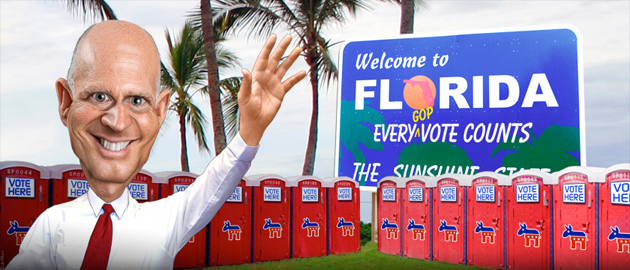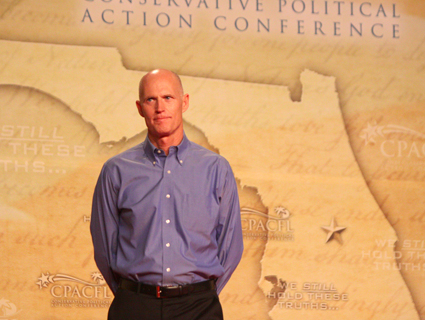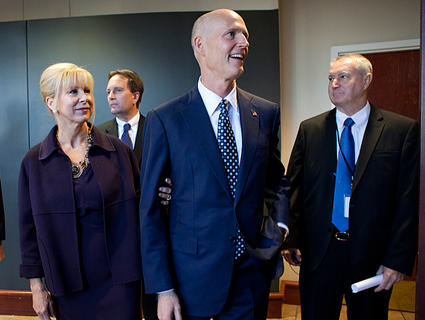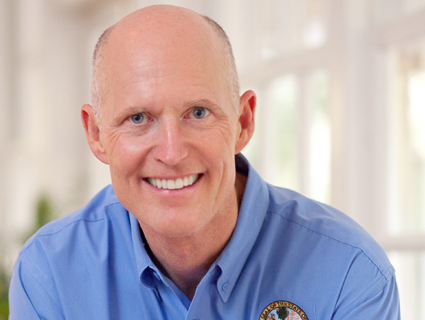
With friends like these, does Mitt Romney need enemies?<a href="http://www.flickr.com/photos/donkeyhotey/7328617528/">Flickr/Donkey Hotey</a>
Mitt Romney’s final pre-election visit to Florida Monday morning included a surprise guest: the state’s Republican governor, Rick Scott. “Tomorrow night, Florida is going to go big for Mitt Romney, and it’ll be a precursor to what happens in the country,” Scott told the crowd in his warm-up moments before Romney took the stage.
You might expect a presidential candidate to stump with a friendly swing-state governor on the eve of a tight election. But Scott’s no ordinary governor, as we’ve written before. The political novice and former health care executive, who pumped $70 million of his own money into his successful 2010 campaign, has alienated conservatives and progressives alike with a failed costly legal challenge to Obamacare, a failed attempt to charge welfare recipients for their pee, and threatened cuts to disabled care, liberal arts education, rape counseling, and tuberculosis treatment during “the worst outbreak in 20 years.“
A mid-October PPP poll, taken at the height of Republicans’ post-Denver debate bounce, found 37 percent of respondents approving of Rick Scott and 46 percent disapproving. Incredibly, that was a near-all-time high in popularity for Scott. When asked if they’d vote for him or a generic Democrat in the next election, the no-name Dem won, 45-43. Numbers like those have led PPP to call Scott “the most toxic of the raft of Tea Party governors.”
And all that was before this weekend, when Scott capped off his yearlong campaign to tighten voting laws by denying appeals from thousands of Floridians to restore the state’s historically generous early-voting hours, after multiple counties reported snaking lines of voters with wait times of up to half a day.
It was a showdown that began in May 2011, before the GOP presidential primaries had even begun, when Scott pushed through a voting bill that cut the state’s early-voting days from two weeks to one and made it nigh impossible for independent groups, liberal or conservative, to register new voters without facing a ton of red tape and potential prosecution. (The latter effort was halted in August by a federal court judge, who called the registration limits “harsh and impractical.”)
This summer Scott launched an unprecedented purge of registered voters whom he suspected of being noncitizens. Imposed against the will of the state’s 67 county elections supervisors, that purge ended up disenfranchising scores of US citizens—including 30 active and reserve service members in the Tampa area and a 91-year-old World War II vet in Democratic-heavy Broward County.
That was small potatoes compared with the controversy that broke out over the weekend, when voters in Democratic-heavy urban counties—Miami-Dade, Broward, Palm Beach, Hillsborough—spent up to seven hours waiting in long lines to cast votes before the work week started, with many being turned away after closing time. That led to appeals from numerous political leaders and voters for Scott to extend voting hours by executive order—a move that two of his Republican predecessors, Jeb Bush and Charlie Crist, took in previous elections. But Scott refused. “Early voting will end Saturday night,” he announced Friday at a GOP fundraiser, paradoxically adding: “But I want everybody to get out to vote.”
Florida is a pivotal part of Romney’s remaining paths to presidential victory—he almost can’t win the election without carrying the Sunshine State. “Florida is everything,” Paul Ryan told a crowd of supporters there Sunday. And Scott is doing his part to keep the vote Republican-leaning, even as polls show the state has become a true toss-up.
But Romney and Ryan’s efforts to pull out all the stops Monday morning could potentially backfire. Romney’s rally was held at the airport in Sanford, not far from where 17-year-old Trayvon Martin was killed last February—a tragedy that Scott bungled, and that brought national scrutiny to the state’s draconian “stand your ground” deadly-force law. That law was sponsored by the same Republican legislator who helped shepherd Scott’s bill to shorten voter hours last year.
“We need every single vote in Florida,” Romney told the Sanford crowd. “We can begin a better tomorrow, tomorrow.” Scott’s voting tactics may have assisted the ex-Massachusetts governor. But given the anti-Scott voter backlash in Florida, Romney may have just frittered away his advantage by standing with Scott in Sanford.














